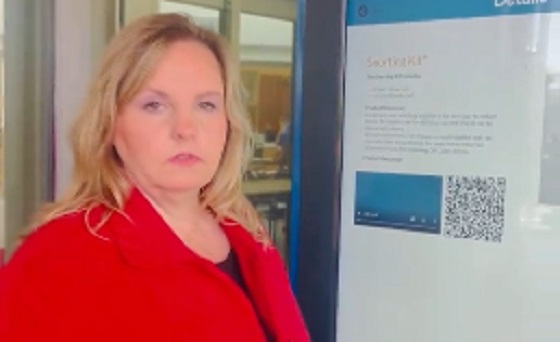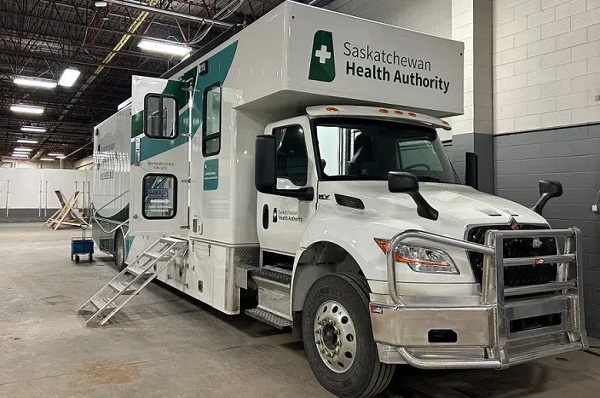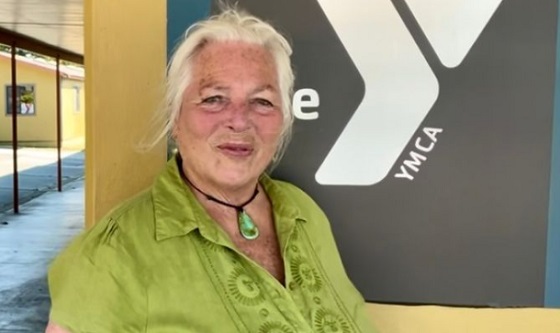Addictions
BC MLA candidate picks up free crack pipes and cocaine snorting kit

It’s a pretty big stretch to go from an NDP MLA to running for the Conservative Party. But Gwen O’Mahony may not be your average politician.
20 years ago, due to the devastating impact of addiction on the people who should have been caregivers, O’Manhony gained custody of two nieces. That experience led her to a deep understanding of mismanagement in the Ministry of Children and Family Development. Eventually Gwen O’Mahony became a candidate herself. In 2012 she became the first NDP and first woman elected at an MLA for upper Fraser Valley.
Over the next dozen years her work at harm reduction, and for the protection of women led to a split from the New Democrats. This fall, O’Mahony will be a Conservative candidate in BC’s provincial election.
As part of her campaign against the current “harm reduction” policies of the Provincial NDP, O’Mahony has posted a video to show her constituents, British Columbians, and Canadians how easy it is to live an addicted lifestyle. The extent to which the government goes to enable drug use, is frankly shocking.
Free crack pipes & cocaine snorting kits Vending Machine located directly outside the Nanaimo Hospital ER
The sound of children playing in background as I shoot this video
Yet another example of enabling addiction instead of offering treatment#bcpoli pic.twitter.com/hLvx17jay6— Gwen O'Mahony (@gwenomahony) August 27, 2024
About Gwen O’Mahony
Gwen O’Mahony is the former Member of the Legislative Assembly for Chilliwack-Hope. She served as the Deputy Critic for Advanced Education and Critic of Skills training. A passionate leader, Gwen is the Conservative Party of BC Candidate in the new riding of Nanaimo-Lantzville. With over 20 years of combined leadership experience in the not-for profit, government and private sectors, Gwen brings a wealth of knowledge and skill to the Conservative team.
Motivated to Fix the System
Gwen is no stranger to the devastating impacts of addiction on families. In 2004, she gained custody of her two nieces, placing her in the epicentre of BC Liberal mismanagement of the Ministry of Children and Family Development–an experience that motivated her to successfully run for public office. After knocking on thousands of doors, she upset a strong BC Liberal candidate to become the first New Democrat and first woman MLA elected to the upper Fraser Valley.
VIU Business Graduate
Gwen graduated with a Master’s of Business Administration degree, with honours, from Vancouver Island University. She has a Master of Science in International Business Management from the University of Hertfordshire, UK. Amidst the global pandemic, she started a business consulting firm that helped countless small to medium sized Vancouver Island Businesses pivot to meet the changing marketplace. As the owner and principal consultant of O’Mahony Consulting, Gwen successfully advised and assisted clients with post pandemic relief grants, business plans and navigating government red tape.
A New Vision
Two significant events and the NDP’s Harm Reduction Policy change had a profound impact on Gwen’s decision to join the Conservative Party of BC. In the summer of 2023, she met with members of CAWsBar in Toronto at the “Keep Prisons Single Sex” protest. She was shocked to learn that biological males could be transferred to women’s prisons by simply self IDing as women. In the fall of 2023, Gwen agreed to moderate a panel discussion on Women’s Spaces, SOGI, Women’ Sports and Gender Ideology. The panelists’ testimonies pertaining to their experience with “cancel culture” were extremely concerning to Gwen and she lobbied her party to look into these issues. Her concerns were met with indifference. After the NDP announced the decriminalization of possession of hard drugs and began prescribing narcotic pills to addicts, Gwen withdrew her NDP membership and joined the Conservative Party of BC. Gwen believes that John Rustad is the only leader brave enough to tackle these issues. She admires his common- sense approach and his dedication to a fair, transparent, democratic process. She’s excited to be part of the Conservative team and represent Nanaimo-Lantzville.
Addictions
New RCMP program steering opioid addicted towards treatment and recovery

News release from Alberta RCMP
Virtual Opioid Dependency Program serves vulnerable population in Red Deer
Since April 2024, your Alberta RCMP’s Community Safety and Well-being Branch (CSWB) has been piloting the Virtual Opioid Dependency Program (VODP) program in Red Deer to assist those facing opioid dependency with initial-stage intervention services. VODP is a collaboration with the Government of Alberta, Recovery Alberta, and the Alberta RCMP, and was created to help address opioid addiction across the province.
Red Deer’s VODP consists of two teams, each consisting of a police officer and a paramedic. These teams cover the communities of Red Deer, Innisfail, Blackfalds and Sylvan Lake. The goal of the program is to have frontline points of contact that can assist opioid users by getting them access to treatment, counselling, and life-saving medication.
The Alberta RCMP’s role in VODP:
- Conducting outreach in the community, on foot, by vehicle, and even UTV, and interacting with vulnerable persons and talking with them about treatment options and making VODP referrals.
- Attending calls for service in which opioid use may be a factor, such as drug poisonings, open drug use in public, social diversion calls, etc.
- Administering medication such as Suboxone and Sublocade to opioid users who are arrested and lodged in RCMP cells and voluntarily wish to participate in VODP; these medications help with withdrawal symptoms and are the primary method for treating opioid addiction. Individuals may be provided ongoing treatment while in police custody or incarceration.
- Collaborating with agencies in the treatment and addiction space to work together on client care. Red Deer’s VODP chairs a quarterly Vulnerable Populations Working Group meeting consisting of a number of local stakeholders who come together to address both client and community needs.
While accountability for criminal actions is necessary, the Alberta RCMP recognizes that opioid addiction is part of larger social and health issues that require long-term supports. Often people facing addictions are among offenders who land in a cycle of criminality. As first responders, our officers are frequently in contact with these individuals. We are ideally placed to help connect those individuals with the VODP. The Alberta RCMP helps those individuals who wish to participate in the VODP by ensuring that they have access to necessary resources and receive the medical care they need, even while they are in police custody.
Since its start, the Red Deer program has made nearly 2,500 referrals and touchpoints with individuals, discussing VODP participation and treatment options. Some successes of the program include:
- In October 2024, Red Deer VODP assessed a 35-year-old male who was arrested and in police custody. The individual was put in contact with medical care and was prescribed and administered Suboxone. The team members did not have any contact with the male again until April 2025 when the individual visited the detachment to thank the team for treating him with care and dignity while in cells, and for getting him access to treatment. The individual stated he had been sober since, saying the treatment saved his life.
- In May 2025, the VODP team worked with a 14-year-old female who was arrested on warrants and lodged in RCMP cells. She had run away from home and was located downtown using opioids. The team spoke to the girl about treatment, was referred to VODP, and was administered Sublocade to treat her addiction. During follow-up, the team received positive feedback from both the family and the attending care providers.
The VODP provides same-day medication starts, opioid treatment transition services, and ongoing opioid dependency care to people anywhere in Alberta who are living with opioid addiction. Visit vodp.ca to learn more.
“This collaboration between Alberta’s Government, Recovery Alberta and the RCMP is a powerful example of how partnerships between health and public safety can change lives. The Virtual Opioid Dependency Program can be the first step in a person’s journey to recovery,” says Alberta’s Minister of Mental Health and Addiction Rick Wilson. “By connecting people to treatment when and where they need it most, we are helping build more paths to recovery and to a healthier Alberta.”
“Part of the Alberta RCMP’s CSWB mandate is the enhancement of public safety through community partnerships,” says Supt. Holly Glassford, Detachment Commander of Red Deer RCMP. “Through VODP, we are committed to building upon community partnerships with social and health agencies, so that we can increase accessibility to supports in our city and reduce crime in Red Deer. Together we are creating a stronger, safer Alberta.”
Addictions
Saskatchewan launches small fleet of wellness buses to expand addictions care

By Alexandra Keeler
Across Canada, mobile health models are increasingly being used to offer care to rural and underserved communities
Saskatchewan has launched a small fleet of mobile wellness buses to improve access to primary health care, mental health and addiction services in the province.
The first bus began operating in Regina on Feb. 12. Another followed in Prince Albert on March 21. Saskatoon’s bus was unveiled publicly on April 9. All three are former coach buses that have been retrofitted to provide health care to communities facing barriers to access.
“Mobile health units are proven to improve outcomes for people facing barriers to healthcare,” Kayla DeMong, the executive director of addiction treatment centre Prairie Harm Reduction, told Canadian Affairs in an email.
“We fully support this innovative approach and are excited to work alongside the health bus teams to ensure the people we support receive the care they need, when and where they need it.”
Wellness buses
Like all provinces, Saskatchewan has been grappling with the opioid crisis.
In 2023, an estimated 457 individuals died from overdoses in the province. In 2024, that number fell to 346. But the province continues to struggle with fatal and non-fatal overdoses.
In late February, Saskatoon firefighters responded to more than 25 overdoses in a single 24-hour period. Just over a week later, they responded to 37 overdoses within another 24-hour window.
Saskatchewan’s wellness buses are part of the province’s plan to address these problems. In April 2025, the province announced $2.4 million to purchase and retrofit three coach buses, plus $1.5 million in annual operating funds.
The buses operate on fixed schedules at designated locations around each city. Each bus is staffed with a nurse practitioner, nurse and assessor coordinator who offer services such as overdose reversal kits, addiction medicine and mental health referrals.
“By bringing services directly to where people are, the health buses foster safer, more welcoming spaces and help build trusting relationships between community members and care providers,” said DeMong, executive director of Prairie Harm Reduction.
Saskatoon-based Prairie Harm Reduction is one of the local organizations that partners with the buses to provide additional support services. Prairie Harm Reduction provides a range of family, youth and community supports, and also houses the province’s only fixed supervised consumption site.
The mobile model
Saskatchewan is not the only province using wellness buses. Across Canada, mobile health models are increasingly being used to expand access to care in rural and underserved communities.
In Kingston, Ont., the Street Health Centre operates a retrofitted RV called PORCH (Portable Outreach Care Hub) that serves individuals struggling with homelessness and addiction.
“Our outreach services are extremely popular with our clients and community partners,” Donna Glasspoole, manager at Street Health Centre, said in an emailed statement.
“PORCH hits the road two to three days/week and offers a variety of services, which are dependent on the health care providers and community partners aboard.”
Street Health Centre also has a shuttle service that picks up clients in shelters and brings them to medical clinics or addiction medicine clinics.
The PORCH vehicles are not supported by provincial funding, but instead rely on support from the United Way and other grants. Glasspoole says the centre’s permanent location — which does receive government funding — is more cost-effective to operate.
“The vehicles are expensive to operate and our RV is not great in winter months and requires indoor parking,” she said.

Politically palatable
Many mobile health models currently do not provide controversial services such as supervised drug consumption.
The Saskatchewan Health Authority told Canadian Affairs the province’s new wellness buses will not offer supervised consumption services or safer supply, where drug users are given prescribed opioids as an alternative to toxic street drugs.
“There are no plans to provide supervised consumption services from the wellness buses,” Saskatchewan Health Authority spokesperson Courtney Markewich told Canadian Affairs in a phone call.
This limited scope may make mobile services more politically palatable in provinces that have resisted harm reduction measures.
In Ontario, some harm reduction programs have shifted to mobile models following Premier Doug Ford’s decision to suspend supervised consumption services located within 200 metres of schools and daycares.
In April, Toronto Public Health ended operations at its Victoria Street fixed consumption site, replacing it with street outreach and mobile vans.
The Ontario government’s decision to close the sites is part of a broader pivot away from harm reduction. The province is investing $378 million to transition suspended sites into 19 new “HART Hubs” that offer primary care, mental health, addictions treatment and other supports.
Glasspoole says that what matters most is not whether services are provided at fixed or mobile locations, but how care is delivered.
Models that “reduce barriers to care, [are] non-judgemental, and [are staffed by] trauma-informed providers” are what lead more people toward treatment and recovery, she said in her email.
In Saskatchewan, DeMong hopes the province’s new wellness buses help address persistent service gaps and build trust with underserved communities.
“This initiative is a vital step toward filling long-standing gaps in the continuum of care by providing low-barrier, community-based access to health-care services,” she said.
This article was produced through the Breaking Needles Fellowship Program, which provided a grant to Canadian Affairs, a digital media outlet, to fund journalism exploring addiction and crime in Canada. Articles produced through the Fellowship are co-published by Break The Needle and Canadian Affairs.
Subscribe to Break The Needle
-

 Banks2 days ago
Banks2 days agoWelcome Back, Wells Fargo!
-

 International2 days ago
International2 days agoWoman wins settlement after YMCA banned her for complaining about man in girls’ locker room
-

 Business1 day ago
Business1 day agoPrairie provinces and Newfoundland and Labrador see largest increases in size of government
-

 MxM News1 day ago
MxM News1 day agoDiddy found not guilty of trafficking, faces prison on lesser charge
-

 Alberta1 day ago
Alberta1 day agoAlberta government records $8.3 billion surplus—but the good times may soon end
-

 Bruce Dowbiggin1 day ago
Bruce Dowbiggin1 day agoCanada Day 2025: It’s Time For Boomers To Let The Kids Lead
-

 Economy1 day ago
Economy1 day agoTrump opens door to Iranian oil exports
-

 Agriculture1 day ago
Agriculture1 day agoCanada’s supply management system is failing consumers







